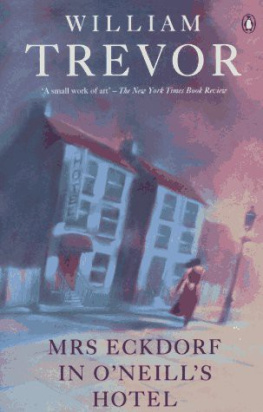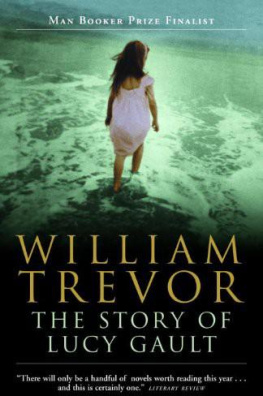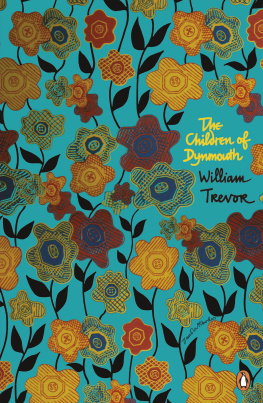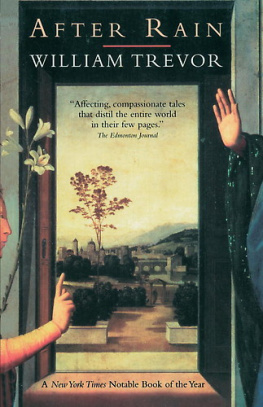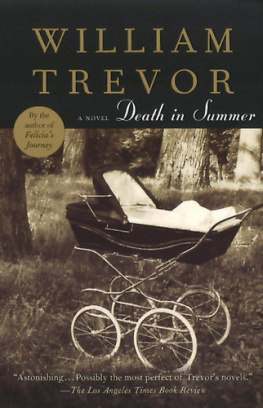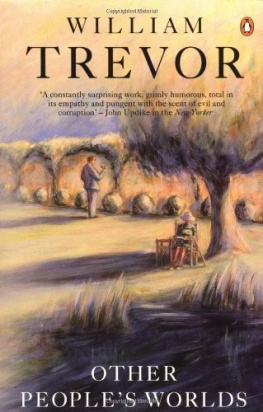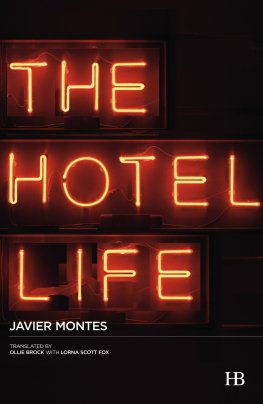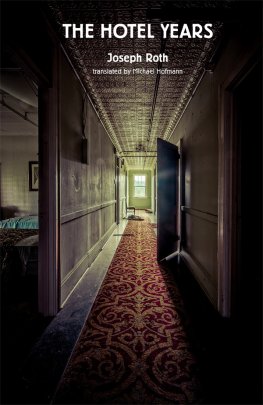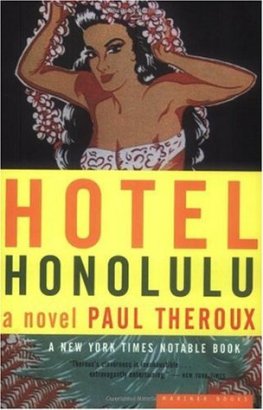Penguin Books
MRS ECKDORF IN ONEILLS HOTEL

William Trevor was born in Mitchelstown, Co. Cork, in 1928, and spent his childhood in provincial Ireland. He attended a number of Irish schools and later Trinity College, Dublin. He is a member of the Irish Academy of Letters.
Among his books are The Old Boys (1964; Hawthornden Prize), The Boarding House (1965), The Love Department (1966), The Day We Got Drunk on Cake (1967), Miss Gomez and the Brethren (1971), The Ballroom of Romance (1972), Elizabeth Alone (1973), Angels at the Ritz (1975; Royal Society of Literature Award), The Children of Dynmouth (1976; Whitbread Award), Lovers of Time (1978), The Distant Past (1979), Other People's Worlds (1980), Beyond the Pale (1981), Fools of Fortune (1983; Whitbread Award), A Writer's Ireland (1984), The News from Ireland (1986), The Silence in the Garden (1988; Yorkshire Post Book of the Year Award), Family Sins (1989) and Two Lives (1991), which was shortlisted for the Sunday Express Book of the Year Award and which includes the Booker shortlisted novella Reading Turgenev. He is the editor of The Oxford Book of Irish Short Stories (1989), and has also written many plays for the stage, and for radio and television. Several of his television plays have been based on his short stories. Many of his books are published by Penguin, including an omnibus, The Stories of William Trevor, containing five collections of stories. In 1976 William Trevor received the Allied Irish Banks Prize, and in 1977 was awarded an honorary CBE in recognition of his valuable services to literature. In 1992 he received the Sunday Times Award for Literary Excellence.
Im Ivy Eckdorf, said Mrs Eckdorf as the aeroplane rose from the ground. How dyou do?
The person beside her, a stoutly made red-cheeked Englishman who happened at the time to be reading of unrest in Syria, lowered his evening newspaper and smiled at Mrs Eckdorf. He did not give his name, since he saw no cause to barter names with a stranger on an air-flight. He displayed further goodwill by nodding. He lifted his newspaper again.
Now what are we going to take to drink? said Mrs Eckdorf. She reached above her and turned on the little orange light that indicated a desire for attention. I loathe being .up in the sky,' she confessed. Especially at night. Cognac for me, she said when the hostess came. Now what for you, my dear?'
Amazed that he should be so addressed by a woman he did not know and thinking that he was clearly going to have to pay for her drink, the man asked for whisky. He glanced at Mrs Eckdorf and saw the face of a woman in her late forties, with blonde hair hanging from beneath a cream-coloured hat with a brim. She had eyes of so pale a shade of brown that they were almost yellow, and two reddened lips that were generously full and now were parted in a smile. There was a gap between her teeth, precisely in the centre of this mouth, a slight gap that an ice-cream wafer might just have passed through.
Mrs Eckdorf talked. She took the newspaper from the mans hands and neatly folded it. She placed it behind the flap of the rack in front of him while saying that she had been educated, if you could call it that, at St Monica's School for Girls, an academy at which she had had the misfortune to meet Mitt Tample. Her own mother, Mrs Eckdorf said, had been a most dislikeable person, given to hysteria and lovers. Her father had disappeared one night, saying he was going out to post a letter and not ever returning: who could blame him, Mrs Eckdorf asked the man beside her, the circumstances being what they were? On the other hand, she added, he might have taken her with him.
I turned to Miss Tample, having no one else to turn to, continued Mrs Eckdorf, and she proved, quite monstrously, to be a snake in the grass. You know what I mean?
Well,' said the man.
To this very day Im haunted by the sordid propositions of Miss Tample. "Have cocoa, Ivy, she said to me. Come up and have cocoa: you're looking peaky. An innocent girl, I followed her up those stairs. "Such fun, she said, handing me a mug of stuff with a skin on it. "Take off your tie, she said, "if you're feeling hot, Ivy." And as the hand of this vulturous woman went out to seize mine her sour breath struck my cheek.'
The man beside Mrs Eckdorf began to say something but Mrs Eckdorf gesticulated, indicating that shed rather he didnt interrupt.
Miss Tample, she said, with her brown knitted cardigan and her support stockings, the soft moustache on her upper lip, two panting eyes behind spectacles my God, you should have seen Miss Tample.'
She continued to speak of her life. She ordered further drinks. She was a photographer, she said: she had discovered the world of photography when she had gone to Germany, while still a girl. She had married two German businessmen, yet was herself entirely an English woman, having been born in London. in Maida Vale. I do not advise you, she said, ever to marry a German.
The man shook his head, at the same time stating that he was contentedly married already.
The one who was my husband last, said Mrs Eckdorf, gave me a taste for cognac. Hans-Otto Eckdorf.
Oh yes?'
Indeed. She paused, and then she said: That has been my life. A mother, a father who walked away. And then Miss Tample. And then two German businessmen. The only light in my life is my camera.
I see.'
We are the victims of other people.'
Its often so-
Hoerschelmann was my other husband. He had glasses and no moustache. Hans-Otto had a moustache of sorts. Hoerschelmann was sandy and fatter than Hans-Otto. Hans-Otto was dark.
I see.'
You see me as a brash woman. Well, yes, Im brash. I'm a brash, hard, sick kind of woman: I have no illusions about myself. My marriages failed for unfortunate reasons. I left England because of its unpleasant associations for me: soon I shall have to leave Germany too.
In a different kind of conversational way, the man said he had never been to Germany. Mrs Eckdorf shook her head, seeming to imply that whether or not he had been to Germany was irrelevant.
My last completely happy memories,' said Mrs Eckdorf, had to do with the dolls I had as a little girl. Can you imagine me as a little girl? Is it easy to imagine a woman of forty-six as a little girl at a dolls' tea-party? For all you know I might be drunk. Are you thinking that? If youre interested, what I'm saying is that despite a nicely groomed exterior I have a heart like anyone else.
Yes,' said the man. Of course.
When Hoerschelmann said he would have to divorce me I couldn't bear it. I walked around our apartment holding his shirts to my breast, weeping for hours and hours. Someone telephoned Hoerschelmann after the third day and told him that every morning after he left the apartment I wept noisily. He couldn't understand, because what he left behind was a nicely groomed woman who seemed also to be tough. It wasn't that I loved Hoerschelmann all that much, it was simply that his wishing to divorce me was another nail in the coffin of my life. In the end, naturally, I hated him. Have you been divorced?

